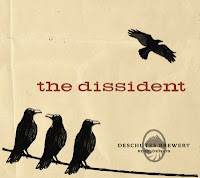Fermented for more than 18 months in isolation from the rest of the beers, The Dissident is a distinctive Oud Bruin, Flanders-style brown ale, with a fruity aroma and flavor, and the first wild yeast beer made by the award-winning Deschutes Brewery.Appropos of our discussion about the evolution of beer, I would like to draw your attention to what is almost a throwaway line in the press release:
To give The Dissident its characteristic sour taste, the brewery used a wild yeast strain called Brettanomyces (also known as Brett) during fermentation. Known throughout the wine world for creating earthy undertones found in many European wines, Brett is used in the beer fermentation process to create strong flavors typically associated with Belgian beers. [I actually thought brett was a bane to wine and always welcomed in the manner of a hop farmer encountering powdery mildew, but hey, who cares about wine?--editor] Unlike English varieties that use traditional inoculated yeasts in the fermentation process, beers made with Brett take much longer to ferment and require additional barrel finishing time to balance the sour flavoring. In The Dissident’s case, this meant aging a portion of it in Pinot noir and Cabernet barrels for more than three months. Another key flavor component comes from the Central Washington cherries that were added 12 months ago.
Due to the wild yeast, The Dissident required special treatment and was held in isolation under lock and key apart from the rest of the brewery’s beers to avoid any cross-contamination. A secondary bottling line was also brought in from an outside contractor to facilitate The Dissident’s bottling and ensure the beer and wild yeast never touched the brewery’s machinery.This is the kind of commitment to evolution that should make a beer drinker's heart sing.
 It means that the brewery didn't just casually decide to whip up a crazy Belgian style for kicks. It's intentional, it's experimental, and it's risky as hell. Whatever the beer ends up tasting like (and I hope it's great), this alone is worthy of praise. So: kudos to you, Deschutes.
It means that the brewery didn't just casually decide to whip up a crazy Belgian style for kicks. It's intentional, it's experimental, and it's risky as hell. Whatever the beer ends up tasting like (and I hope it's great), this alone is worthy of praise. So: kudos to you, Deschutes.Speaking of kudos, I'm really lovin' this label. I don't have a satori award for new labels, but we'd have quite a battle this year between Hop Czar and the Dissident if there was.

Looks like you can have your cake and eat it too. BEST BEER LABEL EVER.
ReplyDeleteI wish someone would explain this. Wine that has brett is NOT sour. Why then is brett said to "sour" beer? Brett makes a band-aidy scent and flavor in wine that in large doses completely effaces the distinctiveness of grape variety. (It is a bane - and should be in beer!) One ale I've tasted that discloses brett on the label - that Wild Flemish ale - also shares this band-aid scent & flavor. In neither case does brett increase acidity in the finished beverage. Is there truly a link between acidity and brettanomyces?
ReplyDelete